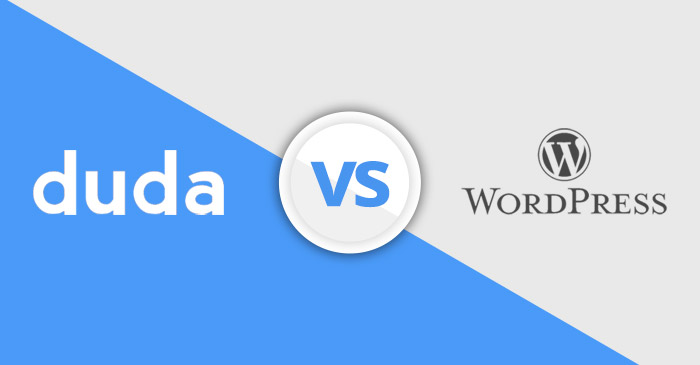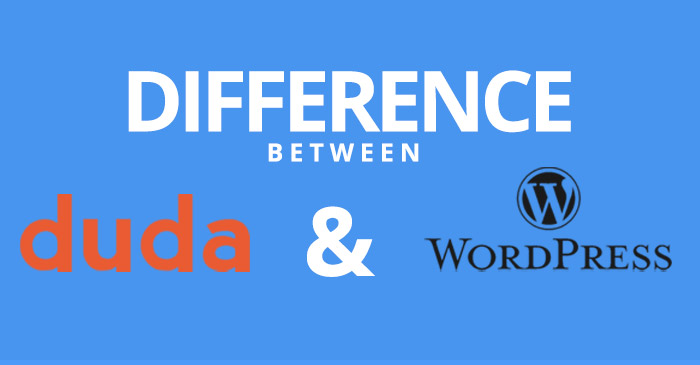
In 2022, website developers have several options for creating a website, whether for their own business or a client. You can opt for a user-friendly solution like a content management system (CMS) or a website builder for advanced options.
Your choice has an impact on how you manage your website later. It’s a good idea to make these decisions before building your website so that you do not need to start from scratch in case you face any problems when using it.
Two of the most common tools used to develop websites today are WordPress and Duda. WordPress is more of a CMS, while Duda is a website builder. The two terms we have used to describe the two options can, however, be used interchangeably, as both serve a similar purpose.
If the choice is between a blogging platform and a content management system, Duda and WordPress offer a wealth of advanced and multifaceted features and website-building tools.
Both platforms are easy to use and allow you to publish multiple posts and pages and customize the design of your website.
In this article, we’ll give you a rundown of WordPress vs. Duda so that you have an idea of which software is right for your website project. Before we get into the Duda vs. WordPress comparison, we will explain what CMS and website builder are and how these two systems differ.
What is a CMS?

A content management system is a software application that works on a web server and allows you to create, search, and store content in a database already stored on that server. The database is typically an SQL database. A CMS is also open source, meaning it’s free to use.
The main advantage of using a CMS is that you are in control of every website element incorporated. You can add your own theme to the content you create, and you do not have to work on a specific host. You can even host the site on your own computer. Creating content like blogs is easy on a CMS.
The downside of a CMS, on the other hand, is that you have to arrange a website host yourself, and if you want to add more customizations, you may require third-party support.
Read More: Shopify Vs. WordPress: Find the Best Ecommerce Tool In 2022!
What is a Website Builder?
A website builder is an application that allows you to make a website from scratch on a specific host. You will have to create an account with the hosting service provider and pay a subscription fee to access the website creation tools. Website builders allow you to easily make a small website and offer a fixed set of templates and e-commerce options right from the start.
Website builders are easy to use as you can set up a multifunctional website quickly and start using it immediately, without worrying about hosting or integrating additional features. That’s very handy if you want to do something yourself, or with minimal help from an expert.
On the other hand, website builders offer limited options for customization. You are stuck with their designs. You will be unable to move to another host or own your website host. Website builders also do not scale well in terms of cost. If you want to make more websites or add more web pages, you’ll have to cough up more money for a bigger plan.
Duda vs. WordPress: What are the Differences?

Duda vs. WordPress have features that make them different from one another. We will take a look at how the software compares in terms of key features that you might want to consider when building your website.
1. Cost
WordPress is a basic CMS, and it’s open source. You can start your project on WordPress without paying a dime, especially if you already have paid for web hosting in advance. There is no competition here when comparing it to Duda.
Duda, in contrast, offers a free trial, but the lowest plan starts at $14/month. So you will have to pay upfront. However, the website they build is hosted on AWS. So if your plan for setting up your website involves AWS, then a Duda CMS brings the same hosting platform to the table.
2. Ease of Use
There is little difference in usability when looking at Duda vs. WordPress. Both are easy to use. WordPress has a slight edge in that it has very basic functionality for blogging and guest accounts. Duda is also slightly overwhelming for starters because it shows a range of options right at the beginning. Once that phase is over, anyone can use Duda comfortably.
Duda offers website building with built-in drag-and-drop functionality. WordPress lacks this option by default, but you can always get a hold of some of its great website-building plugins. Also, unlike WordPress, Duda requires no installation. Everything on Duda can be managed remotely.
3. Security
If you are worried about losing or exposing sensitive information, then security should be at the top of your mind. WordPress’ core platform is very secure, as they have significantly upgraded it over time. With WordPress, however, you will have to check your hosting options and keep their best practices in mind.
If you are working on Duda, you will be presented with many pre-configured options for malware protection, access control, and backups. It is convenient, but some custom options are available only in the bigger plans.
Overall, both platforms offer a good level of security, but the implementation is different in each software.
4. Customization
This one is a decisive factor in picking one of the two. Everyone has their requirements for their website design. Some people want a fancy design, while others can roll with a simple theme. Understanding the limits of Duda vs. WordPress on customization will save you from many headaches later.
WordPress allows virtually unlimited visual customization. You can download many templates for web themes, and then make more changes to them to suit your style. If you know some HTML and CSS code, you can tweak it to your heart’s content. If you are a wizard at it, then it’s way better.
Aside from the design features, WordPress also has many interface plugins that are available for free or at a premium price. There’s a large and supportive community, so you will be able to get all the help you need. You can, therefore, customize your website database easily. You should ensure you do not add too much to your WordPress website, as that can slow it down.
On the flip side, Duda is not as flexible as WordPress. You get a limited amount of options for website templates, which work if you have something simple in mind. It will allow you to quickly replicate branding or e-commerce sites, but you can only work with preset configurations. Each configuration is optimized for a specific user experience, so you do not have to worry about how your design will perform.
WordPress is a powerful platform for individuals, but Duda is more user-friendly and easier to install. A website created with Duda requires no coding knowledge and does not require a server or page builder. If you have multiple team members working on your project, Duda has integrated team collaboration tools that can speed up the overall website-building process. WordPress is the clear winner on customization, although Duda makes it up for speed and convenience.
The Verdict on Duda vs. WordPress
Both WordPress and Duda CMS offer excellent functionality for your commercial or personal website. Many developers may opt for WordPress, as it has been around for a long time and gives a high degree of customization. However, Duda is a viable alternative if you have the budget and agile workflow requirements. At the end of the Duda vs. WordPress showdown, it’s all a matter of personal choice and preference.
Have a WordPress or Duda website in mind? Arturo Digital is a professional digital consultancy that can provide you with a flexible plan for your website to suit your needs. Contact us today and let our professional and seasoned website designers, with deep expertise in WordPress and Duda development platforms, take your online business to the next level!